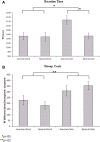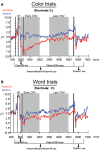Modulation of early and late event-related potentials by emotion
- PMID: 23162444
- PMCID: PMC3492845
- DOI: 10.3389/fnint.2012.00102
Modulation of early and late event-related potentials by emotion
Abstract
Although emotionally salient stimuli influence higher order information processing, the relative vulnerability of specific stages of cognitive processing to modulation by emotional input remains elusive. To test the temporal dynamics of emotional interference during executive function, we recorded event-related potentials (ERPs) while participants performed an effortful anticipation task with aversive emotional and neutral distracters. Participants were presented with a modified delayed Stroop task that dissociated the anticipation of an easier or more difficult task (instructional cues to attend to word vs. color) from the response to the Stroop stimulus, while aversive and neutral pictures were displayed during the delay period. Our results indicated a relative decrease in the amplitude of the contingent negative variation (CNV) during aversive trials that was greater during the early anticipatory phase than during the later response preparation phase, and greater during (the more difficult) color than word trials. During the initial stage of cue processing, there was also significant interaction between emotion and anticipatory difficulty on N1 amplitude, where emotional stimuli led to significantly enhanced negativity during color cues relative to word cues. These results suggest that earlier processes of orientation and effortful anticipation may reflect executive engagement that is influenced by emotional interference while later phases of response preparation may be modulated by emotional interference regardless of anticipatory difficulty.
Keywords: anticipation; contingent negative variation; distraction; emotion.
Figures




Similar articles
-
Level of uncertainty about the affective nature of a pictorial stimulus influences anticipatory neural processes: An event-related potential (ERP) study.Neuropsychologia. 2020 Sep;146:107525. doi: 10.1016/j.neuropsychologia.2020.107525. Epub 2020 Jun 11. Neuropsychologia. 2020. PMID: 32535130
-
Emotional anticipation rather than processing is altered in patients with vasovagal syncope.Clin Neurophysiol. 2012 Jul;123(7):1319-27. doi: 10.1016/j.clinph.2011.12.003. Epub 2012 Jan 2. Clin Neurophysiol. 2012. PMID: 22217960
-
Teasing apart the anticipatory and consummatory processing of monetary incentives: An event-related potential study of reward dynamics.Psychophysiology. 2015 Nov;52(11):1470-82. doi: 10.1111/psyp.12504. Epub 2015 Jul 29. Psychophysiology. 2015. PMID: 26223291
-
Differential effects of uncertainty on LPP responses to emotional events during explicit and implicit anticipation.Int J Psychophysiol. 2018 Jul;129:41-51. doi: 10.1016/j.ijpsycho.2018.04.012. Epub 2018 Apr 25. Int J Psychophysiol. 2018. PMID: 29704580
-
Neural Correlates of Emotion Processing in Word Detection Task.Front Psychol. 2018 May 25;9:832. doi: 10.3389/fpsyg.2018.00832. eCollection 2018. Front Psychol. 2018. PMID: 29887824 Free PMC article.
Cited by
-
Current research and emerging directions in emotion-cognition interactions.Front Integr Neurosci. 2014 Nov 11;8:83. doi: 10.3389/fnint.2014.00083. eCollection 2014. Front Integr Neurosci. 2014. PMID: 25426034 Free PMC article. No abstract available.
-
When Emotions Matter: Focusing on Emotion Improves Working Memory Updating in Older Adults.Front Psychol. 2017 Sep 15;8:1565. doi: 10.3389/fpsyg.2017.01565. eCollection 2017. Front Psychol. 2017. PMID: 28966602 Free PMC article.
-
Salient distractors open the door of perception: alpha desynchronization marks sensory gating in a working memory task.Sci Rep. 2020 Nov 5;10(1):19179. doi: 10.1038/s41598-020-76190-3. Sci Rep. 2020. PMID: 33154495 Free PMC article.
-
Emotional intensity influences pre-implementation and implementation of distraction and reappraisal.Soc Cogn Affect Neurosci. 2015 Oct;10(10):1329-37. doi: 10.1093/scan/nsv022. Epub 2015 Feb 19. Soc Cogn Affect Neurosci. 2015. PMID: 25700568 Free PMC article.
-
Pain expectation and avoidance in the social context: an electrophysiological study.J Physiol Sci. 2021 Sep 6;71(1):29. doi: 10.1186/s12576-021-00813-1. J Physiol Sci. 2021. PMID: 34488617 Free PMC article.
References
Grants and funding
LinkOut - more resources
Full Text Sources

